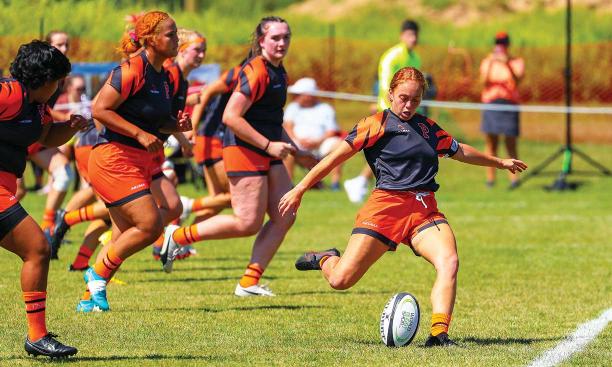
Kathryn-Alexa Kennedy ’23 is grateful for the changes that have come with Princeton’s elevating the women’s rugby program from club to varsity status this year.
Their strength and conditioning sessions are more formal now. They have full access to a sports psychologist, dietitian, and academic advisers. They received gear from the school and moved in early for their first official preseason. Maybe the most significant development is having their own locker room in Caldwell Field House.
“It’s wonderful,” said Kennedy. “We don’t have to go to dinner smelling anymore.”
Kennedy is in her fourth year playing after signing up at the activities fair her freshman year. A self-described average athlete in high school who played soccer and golf and ran cross country and track and field, she said rugby filled her need for structure.
“The girls were really supportive and welcoming,” she said. “It’s the healthiest athletic environment I’ve ever been in in my life. I think I craved that mentorship I got from the upperclassmen.”
They helped her select a major, apply for jobs, and adapt socially. Now a captain, Kennedy has brought others to the sport. Rugby welcomed its first three official recruits this year after going varsity — it’s the first sport Princeton has introduced since women’s water polo in 1997 — but most players have no rugby experience. The team relies on word of mouth, the activities fair, and even the call of nature to find walk-ons.
“The girls were really supportive and welcoming. It’s the healthiest athletic environment I’ve ever been in in my life. I think I craved that mentorship I got from the upperclassmen.” — Kathryn-Alexa Kennedy ’23
“The No. 1 method is a poster on the back of a bathroom stall,” said head coach Josie Ziluca. “It’s amazing how many of our players — some of our most well-known players from the past — that is how they joined the team.”
Numbers are just one challenge. The Tigers’ season-opening 53-21 loss to Sacred Heart on Sept. 3 was the first time they went 15-on-15 in the fall semester because they haven’t had enough players to simulate two full sides in practice. Then there’s experience: A large class graduated last spring, and it takes veteran players and coaches to teach novices to play what Ziluca labels a “collision sport” safely.
“We need to have more student-athletes coming in who have a background in it to make this sport safer for everyone,” said Ziluca. “I’m hoping over the years we’ll see that change.”
Women’s club rugby at Princeton began in 1979, and the program is using its elevated platform to increase awareness of the emerging sport. The Tigers are the fourth Ivy League team, so the conference is just one shy of the minimum to compete for an Ivy championship. There are now 30 college teams nationally, with 40 required to move from the National Intercollegiate Rugby Association umbrella to an accredited NCAA championship.
“It’s still a fairly young sport in the U.S.,” Ziluca said. “Half the battle is just getting people to understand the rules. It’s hard to watch something if you don’t understand. We’re working on that as a team.”
Princeton faces a daunting schedule in its first season. The Tigers lost their first home game 87-0 to Army, last year’s national runner-up. On Oct. 22, they will play defending champion Dartmouth. In the program opener, Princeton fell behind 31-0 but settled down and played Sacred Heart to a one-point second-half difference.
Becoming more competitive at the varsity level in the fall 15s season and spring 7s season is a goal, but so is sustaining the tenets and culture that made the club program such a draw.
“I don’t want the fact that we’re going varsity now to change how we approach recruiting or how we approach dealing with sensitive matters on the team,” Kennedy said. “For so many of the girls on the team, this is so much more than an opportunity to play rugby.”
